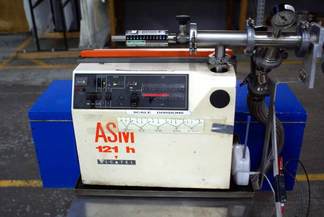Call: 708-425-9080
Why is Helium Used in Vacuum Leak Detection?
 Helium Mass Spectrometer Leak Detector
Helium Mass Spectrometer Leak Detector
Helium mass spectrometer leak detection is the most common form of leak detection used in high and ultra high vacuum systems. Helium leak detectors are routinely sensitive to leak rates in the range of 1x10-11 std cubic centimeters per second. Practical leak testing of systems to leak rates in the order of 1x10-9 std cc/sec is standard industry practice. To give this some perspective, a 1x10-9 std cc/sec leak is roughly equivalent to a release of 1 cubic centimeter of gas in 30 years. So the leaks being detected are very small. Mass spectrometer tubes can be manufactured to detect other gases, Residual Gas Analyzers do just that, separating and measuring a range of gases. So why is helium the “go to” gas for leak detection?
Multiple sources agree on these important reasons.
If this article was of interest to you, drop us a line and let us know. Your feedback will help us determine what type of content you would like to see in our newsletter and posted to the website.
Multiple sources agree on these important reasons.
- Helium is safe.
Helium is a noble gas, it is nontoxic, inert, inflammable, and nonreactive. Helium is often used in air mixes in deep sea diving and space exploration. The only hazard it presents is asphyxiation if present in such a high concentration as to displace breathable oxygen. An unlikely occurrence in normal leak testing. - Helium molecules are small.
Helium gas has the lightest and smallest molecule of the noble gases. Only hydrogen has a smaller or lighter molecule. Hydrogen is of course both reactive and flammable. Helium's low molecular weight allows it to flow through the tiniest of leak paths. - Helium is a very small part of the atmosphere.
Helium is only 5.24 x10-4 percent by volume of the atmosphere. Leak detectors can be easily calibrated to ignore atmospheric helium background, so the only helium detected is that introduced by the test. - Helium is very distinguishable.
The molecules that enter the helium mass spectrometer are first ionized then driven into a magnetic field that changes the direction of all the ions in a precise way; that change of direction being dependent upon the mass of the ion. Thus the lighter helium ions are directed to a collector for measurement while other heavier ions and lighter (hydrogen molecules) are intercepted and their energy grounded. The mass properties of the helium ions make them easily distinguishable (with the exception of deuterium) by the mass spectrometer.
If this article was of interest to you, drop us a line and let us know. Your feedback will help us determine what type of content you would like to see in our newsletter and posted to the website.



